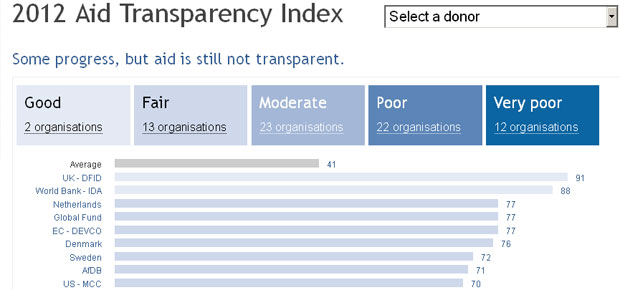Public information would seem like a pre-requisite if a government is to be managing billions in tax payers’ money. It would even appear more tantamount if this money was destined for the world’s poorest as development financing for schools, clinics, clean water and environmental projects.
Yet the world’s aid industry – which totaled nearly US$ 134 billion in 2011 in official flows – apparently doesn’t think so. According to an index released by Publish What You Fund, four out of every five aid agencies that were assessed scored 60 per cent or lower for their levels of transparency. This included whether or not they published their total aid budget, annual report and procurement policies.
The average score for all the 72 organisations included in the study was 41 per cent. If these agencies were a student seeking a grade, they would get an “F” on their performance (à la the US system). Luckily, some leaders like the UK Department for International Development (91 per cent) and the World Bank (88 per cent) helped to bring up the pack. Then again, there are the scores of China (2 per cent) and Malta (0 per cent).
While it might be hard to believe, the overall performance of the assessed organisations has improved over previous years. It went up seven percentage points from the 2011 index. And this increase is seen as being a direct impact of efforts to get different organisations to sign up to a global aid transparency standard to make the information they produce comparable, timely and more accessible. Currently, 33 organisations are signatories to the standard – known as the International Aid Transparency Initiative (IATI) – which represents a coverage of three-fourths of all official aid flows. Not surprising, of the 16 top ranking organisations on the index, all are IATI signatories and are implementing the standard.
Organisations included in the index range from multilateral donors like the World Bank to bilateral donors large and small (from Australia to Switzerland). Private foundations (i.e. the Gates Foundation), climate finance funds and development finance institutions are also included in the index, given the influence and funds they push through the aid system. Overall, 43 different transparency indicators were assessed for each organisation. They are broken up to look at the information made publicly available at the organisational, country and activity (or project) level.
So why is it taking this long for development organisations to be more transparent about how they spend their money? There is no clear answer but many different arrows are pointing to an organisation’s political will and the resources committed to make the aid system more transparent, accountable and effective.
There is a ray of hope. All development actors – from traditional players like France to newcomers such as Brazil – had committed last November in Busan to implement a common aid transparency standard and get their information out to the public. By the end of this year, all are supposed to have submitted their plans for how this will happen.
Whether this will actually happen is any one’s guess. Germany, which falls among the lower performers on the index, was one of the original signatories to IATI. Over the last four years, it has yet to provide its implementation
Yet such open information about aid is critical to make sure that monies are spent correctly, results happen and corruption is prevented. In a world of tighter public budgets, it is essential that each dollar, euro or real goes further and has the greatest impact in fighting poverty and promoting a country’s – and community’s – development.
Let’s hope these development organisations start doing their transparency “homework” so that they make a passing grade on next year’s index.
















 Connect with us on Facebook
Connect with us on Facebook Follow us on Twitter
Follow us on Twitter